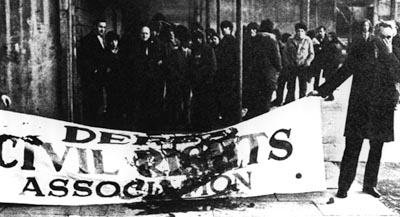IRA Calls It Quits
After the 1916 Rising, the Republic of Ireland finally won its freedom from England in 1918. The political party Sinn Fein had as much to do with its freedom as the revolution did, voting in the English Parliament to cede from England. There was one notable exception in 1921: a 5500-mile stretch at the northern tip of Ireland, already more industrialized than its southern neighbor. At the time, the populace of Northern Ireland was largely made up of British loyalists (Protestants) with very few Irish Republicans (Catholics) living there.The religious associations between the two groups became a litmus test for political affiliation. If one was Catholic, then one was treated as a rebel. Incidents of British brutality and negligence in certain Catholic neighborhoods were commonly reported. Thus, the Irish Republican Army was formed to protect those Catholic citizens from their Protestant neighbors.
In 1969, the Catholic minority staged a series of civil rights marches intent on securing fair allocation of public housing and fair employment practices. After many Protestant anti-protests ignited violence, the British Army was sent in as a neutral force to protect the Catholic protesters from the Protestant mobs and paramilitary. The violence, despite British forces, spiraled out of control, and marked the suspension of Northern Ireland's Parliament.
This consummated in 1972's Bloody Sunday where 12 unarmed men and boys were killed and 14 others wounded when British forces laid siege to a peaceful Civil Rights rally in Derry, Northern Ireland. It was this fateful event that marked the spike in the IRA's recruitment and its increased role in the Northern Ireland resistance movement.

The violence that ignited both Northern Ireland and England finally paused in 1998, when the "Good Friday" peace accord was signed by the IRA, Protestant paramilitary leaders and the Irish and English governments. Thus, only the political party Sinn Fein remained in pursuit of a unified Ireland, constantly denying its one-time association with the violent IRA.
Now, today marks the IRA announcement that it will end its violent campaign entirely:
The leadership of Oglaigh na hEireann has formally ordered an end to the armed campaign.This painfully slow process towards peace in Northern Ireland seems to have been embraced fully by even its most radical elements. Whether it was simply the wearisome strife and destruction since 1972 that ate away at the incessant violence or the new violence in London and the terrorist threat at large that woke the IRA up, there is for a time peace.
This will take effect from 4pm this afternoon.
All IRA units have been ordered to dump arms.
All Volunteers have been instructed to assist the development of purely political and democratic programmes through exclusively peaceful means.
Volunteers must not engage in any other activities whatsoever.
And that for now, may be all that matters.


0 Comments:
Post a Comment
<< Home